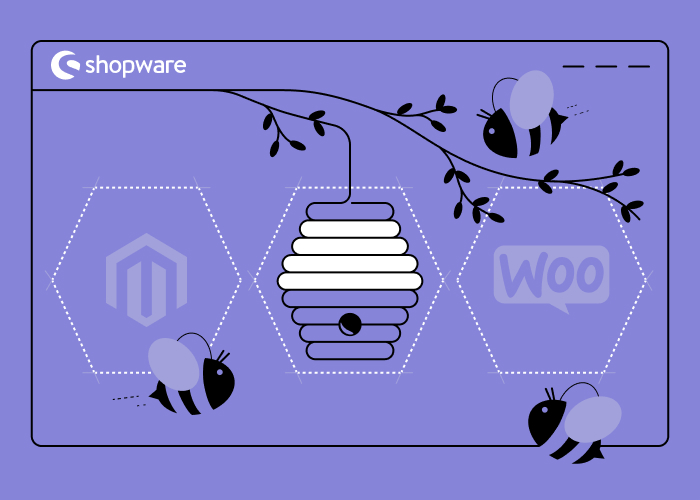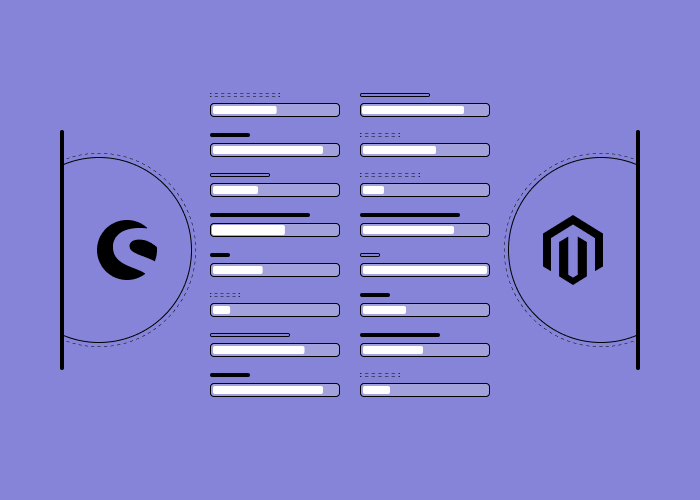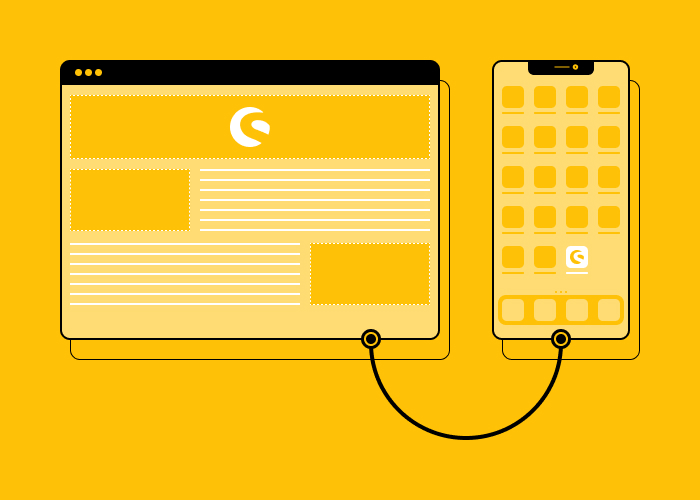A few years ago, people believed that online commerce would be driven by mobile applications. But a replacement was found quite quickly - convenient, simple, pleasant to use and administer. In this article, we will tell you what a Shopware PWA is, its technologies, advantages, disadvantages, and what makes the Shopware PWA unique.
What Is Shopware Progressive Web App?
.jpg)
Image Source: www.pexels.com
PWA (Progressive Web App) for Shopware is a technology in web development that can help you build a website visually and functionally resembling a mobile application, only it will be displayed in a browser.
What Technologies Are Used in Shopware PWA?
.jpg)
Image Source: www.pexels.com
PWA sites are built using CSS, JavaScript, HTML. In the browser, they look like a regular website but interact with the visitor like a mobile application. Advanced functionality allows you to add a site or a separate page to the screen of any device, as well as send push notifications.
PWA enables an application website to work offline. A good example is Google Docs - this is an online office, but with the option to interact with it offline.
Why Use a PWA for E-commerce?
The number of mobile users is growing, so the introduction of PWA is becoming more relevant than ever. Here are some of the PWA site features to look out for, and the top reasons to incorporate technology into your business:
The installing of your application on your user’s device
The user downloads the application and gets access to the service bypassing the Windows Store, App Store, Play Store, and others. This simplifies and speeds up the installation process.
The online store is also available offline
PWAs provide session continuity, which can positively impact conversions for e-commerce sites. Even if the user has lost the internet connection, they can still add products to the cart or just view the website, enter the necessary information in the checkout form, and much more. The checkout will be completed automatically when the customer has internet access again, as the PWA synchronizes the information and updates it.
High download speed
This Shopware progressive web app loads and responds to user actions much faster than regular websites. The technology can solve the problem of slow downloads even with a weak internet connection.
Therefore, if you switch to PWA, you can forget about any worries related to page load speed. In short, they use an additional JS Service Worker file to cache data. For example, the PWA for Shopware 6 of the Vue Storefront application achieved a download speed of an e-store catalog of 0.1 seconds.
Interactivity
Thanks to push notifications, now business owners can always stay in touch with users, increasing their interest and engagement. It is a good tool for retaining clients and attracting new people.
Security
All data is transmitted over the HTTPS protocol, which ensures the security of using Shopware progressive web apps.
SEO promotion
PWA is ranked by search engines like regular websites, so SEO promotion doesn't have any special differences from promoting an online store.
Successful Examples of PWA Implementation in E-commerce
PWA implementation has an impact on key site metrics such as conversion, loading speed, and more. Here are some examples of successful PWA sites:
- PWAs helped AliExpress to increase conversion rates from iOS by 82% and for new users by 104%;
- After the introduction of PWA on the mobile version of their website, Lancôme's conversion rate increased by 17%;
- With this technology, Rooted Objects improved conversion rates by 162%, increased page loading speed by 25%, and their revenue by 44%.
Advantages and Disadvantages of PWA
Like any new technology, PWA has many advantages and disadvantages that should be taken into account.
Advantages Shopware PWA
-
PWA can be downloaded to any mobile device (tablet, phone), laptop, desktop. The technology is supported by almost all popular operating systems.
-
Users do not need to download and install updates on their own, new functionality and any changes are added by developers remotely.
-
Caching strategy and Service Worker guarantee offline access to the resource.
-
PWA is easier and cheaper to develop than creating a native application for each operating system.
-
Progressive Web Apps are much smaller in size than native apps because progressive apps leverage the power of the browser effectively. In this case, the installation takes place instantly, since all the necessary components have already been installed in the cache when the user first touched the site.
-
Since 2019, PWA can be installed in two ways: bypassing app stores and through App Store, Google Play, and others.
-
Ability to switch to PWA from links in social networks, from SERPs, while on the site.
-
Significant savings and freedom from the rules of store applications. Moreover, you do not have to pay the fee of up to 30% of the sales.
-
It is launched separately from the browser after installation.
-
Pop-up notifications and offline access, as well as all other PWA functionality, will work without installing the application.
Disadvantages Shopware PWA
-
As of 2021, some operating systems, browsers, and devices only support partial PWA functionality.
-
There is no way to establish full and active use of iOS, as the system version must be 11.3+. There are also restrictions on access to some built-in functions like Siri, In-App Payments, and more.
-
The work and functionality of the website in offline mode are limited.
-
It should be borne in mind that the use of PWA significantly increases battery consumption.
When to Implement an E-commerce PWA
If your project meets all these criteria, or most of them, then it is worth considering implementing the PWA technology with the next redesign:
-
PWA is a great solution if you have a limited budget or not enough resources to create a separate native application for your project;
-
In case you have a small business or startup by e-commerce standards;
-
Your clients are predominantly Android users, not iOS users;
-
If you notice that conversion rates on your sites have dropped;
-
If you want to improve the user experience for mobile devices;
-
Your USP is instant service;
-
You are planning to change or have already changed the design of your online store.
-
PWA is a web development technology that provides a ton of possibilities for e-commerce projects.
Shopware Vue Storefront PWA vs Magento PWA
PWA Studio is a stock technology for Magento, which is ideally compatible with other functions of this system.
In its turn, Vue Storefront is a standalone PWA e-commerce showcase and one of the leading options for PWA stores. Its main advantage is that it can connect to any e-commerce server (BigCommerce, Magento, Pimcore, and others).
Advantages of Vue Storefront:
- Platform independence;
- Compatible with Magento 1 and 2;
- Open-source project;
- Strong member base;
- Open-source project.
Disadvantages of Vue Storefront:
- Potential risk of conflict after a future Magento update;
- Developed by an independent company.
Advantages of Magento PWA Studio:
- Open-source project;
- An impressive set of tools for customizing and designing a showcase;
- Several production-ready websites;
- Includes GraphQL support;
- Strong member base;
- Dedicated PWA Team.
Disadvantages of Magento PWA Studio:
- Available only for Magento 2.3.x;
- Lacks features.
Read our review of Magento PWA for more details.
With the latest business trends in mind, Magento 2 is emerging as a convenient platform for progressive web applications. Its tools are very popular in creating lightning-fast PWA interfaces, extensions, components to sell on the Magento Marketplace, and also help developers learn PWA techniques.
The PWA Framework: Seamlessly Integrated with Shopware 6
Shopware 6 Progressive Web Applications (PWA) is an open-source e-commerce platform popular mainly in English-speaking countries. It is based on two equally well-known frameworks - Vue.js and Symfony.
If you want to expand it, it all comes down to the fact that Shopware 6 is a versatile b2b tool, easy to use, that has proven itself to be a very robust and flexible platform for e-commerce solutions.
With a large number of offers on the Shopware plugin store, you can complement existing functionality, complementing it with those tools that suit your needs as well as your customers’ demands.
Conclusion
Shopware PWA is a web development technology that provides a ton of possibilities for e-commerce projects. All characteristics of the PWA give reason to consider this development as the technology of the future. With it, you can reach as many people as possible with the lowest cost and the highest possible efficiency.
If you need any help with Shopware PWA, DevOps expertise, e-commerce, or mobile development, experts at Dinarys can help - just contact us with your project idea.


.jpg)
.jpg)


